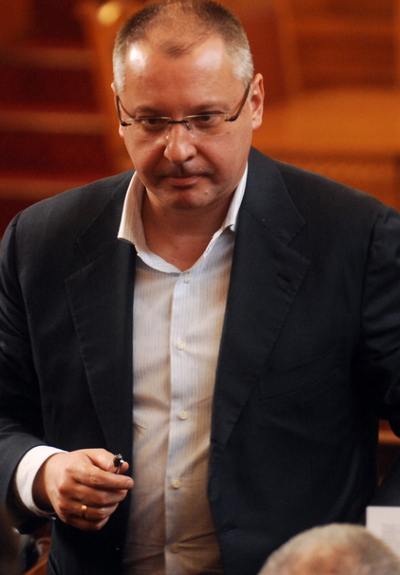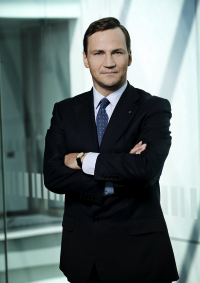A Bulgarian to Watch Out For
Former Prime Minister Sergei Stanishev’s quiet rise toward EU power broker.
May 13, 2014

Can you name a Bulgarian politician? Probably not. This is about to change. Less than a decade after joining the European Union, we are likely to see the emergence of former Bulgarian Prime Minister Sergei Stanishev as a major European political player.
Stanishev, 47, will be one of the key political leaders in Europe following the European Parliament elections on May 25.
In style, Stanishev is a soft-spoken, thoughtful and analytical politician. He provides a clear contrast to the brash, noisy style of much of the political class in the EU’s southeast corner.
Political deciders in bigger capitals will have to get to know Stanishev soon. Europe is exiting a political period when the center-right was firmly in control of the European Union — and also regularly scoring the biggest number of seats in the European Parliament.
According to latest polls, the parties affiliated to the Party of European Socialists, which Stanishev heads, will see an increase of 14% in their share of seats in the European Parliament.
The center-left is neck and neck with the dominant center-right European People’s Party and may yet emerge as the biggest group within the 751-member strong parliament, according to PollWatch, an analysis of opinion polls led by professors at the London School of Economics and Trinity College Dublin.
With voting in 28 countries, each with different political priorities and passions, European Parliament polling is an inexact art. But a sense that the left is a bit up and the right down is unmistakable.
A kingmaker parliament?
This summer will not just bring the choice of a new President of the EU Commission and EU Council as well as new Foreign Affairs chief — but also that of a new President of the Parliament.
Under new rules in the Lisbon Treaty governing the EU, national leaders like Angela Merkel and Francois Hollande have lost their veto power to block a candidate to be Commission president. Instead, the political party groupings in the European Parliament have the power to name candidates.
That will make Sergei Stanishev the man of the hour, if the center-left prevails, as anticipated. His Party of European Socialists (PES) links all the parties likely to dominate in the European Parliament after the May elections.
Moreover, Stanishev has emerged as a particularly effective president of the PES. Stanishev scored a major hit when he persuaded the Italian Partido Democratica to join the Party of European Socialists.
Organized left, disorganized right
The European political right can only dream of such unity. Germany’s Angela Merkel has been unable to persuade British Prime Minister David Cameron to re-unite his Euroskeptic Conservative Party with the broad European center-right group, the European People’s Party.
The latter brings together ruling parties in Germany, Poland, Spain, Sweden, Hungary and nations governed by conservatives.
Stanishev has been quietly making friends and influencing people on the European center-left for many years. His time at the London School of Economics gave him perfect English. Early in Stanishev’s premiership in Bulgaria, in 2005, he deeply impressed UK Prime Minister Tony Blair.
A moderate voice
He also campaigned successfully to take Bulgaria into the EU, against the vitriolic hostility of many in western EU member states. This gave Stanishev a unique network of top politicians across Europe who admire his moderate and modern language.
This moderation has been impressive in the face of ongoing, ugly anti-Bulgarian language by populist editors and Euroskeptic politicians. That theme has recurred in Britain as recently as this year. Critics still see Bulgaria as too poor and too corrupt to deserve EU membership and they have not hesitated to say so.
Stanishev faces other criticisms, as well. Like most Bulgarians, he holds a special regard for Russia for having freed Bulgaria from hated Ottoman rule. Thus, his party does not join the criticism of Putin’s geo-political adventurism.
One problem Stanishev will have to overcome is doubts elsewhere in Europe about Bulgaria’s closeness to Putin.
Sofia has lobbied against sanctions on Moscow over the annexation of Crimea, and Bulgarian energy ministers have admitted that Gazprom has been involved in drafting energy legislation to benefit the Russian gas giant, which works closely to advance Putin’s geo-political ambitions.
If Stanishev is seen as Putin’s man inside the EU, he will lose influence.
Unique challenges?
Moreover, crony capitalism remains endemic in Bulgaria across the political spectrum. This leaves foreign investors in the country perplexed as rules change abruptly to favor national economic actors with ties to politicians.
However, let us not forget that such vice is by no means limited to Eastern Europe. There are so many west European political leaders and parties under police investigation that the accusations of financial impropriety in Bulgaria have little traction.
Nicolas Sarkozy in France or the ruling Partido Popular in Spain have not served as shining role models for Bulgaria. And closer to home, there are almost weekly arrests of former Pasok ministers in Greece.
Stanishev’s network
Stanishev’s successes at bundling up the European center-left, while the center-right continues to bicker, may seem arcane maneuvers.
Even Brussels watchers pay little attention to the pan-European political parties and their leaders like Sergei Stanishev. For the wider international political elites, the cross-border organization of political parties is below the dignity of their consideration.
But this is a mistake, not least because Stanishev (and his counterparts in Europe’s center-right and liberal formations) will play a key role in deciding the next EU leadership team, now that the EU parliament’s role has been enhanced.
Sergei Stanishev now has the mobile phone numbers of – and the right to visit – the new generation of EU political leaders. These are the people who are likely to be increasingly dominant in European politics over the next political cycle.
Bulgaria’s gain
This networking is a major advantage for Bulgaria. The country needs to improve its economic standing in order to attract much needed foreign direct investment — and to demonstrate to outside firms in Bulgaria that they will not face discrimination.
Stanishev’s role as a respected pan-European political leader outside Bulgaria could work to the country’s advantage as Sofia seeks to boost economic growth and cut high unemployment.
Takeaways
Bulgaria's ex-PM Sergei Stanishev will play a key role in deciding the next EU leadership team.
Europe is exiting a political period when the center-right was firmly in control of the European Union.
Stanishev campaigned successfully to take Bulgaria into the EU, against the hostility of many in the western EU.
Critics still see Bulgaria as too poor and too corrupt to deserve EU membership.
Most Bulgarians hold a special regard for Russia for having freed Bulgaria from hated Ottoman rule.
Nicolas Sarkozy in France or Partido Popular in Spain have not served as shining role models for Bulgaria.
Stanishev’s role as a pan-European political leader outside Bulgaria could work to the country’s advantage.
Read previous

Radek Sikorski: Truthteller in Action
May 11, 2014
